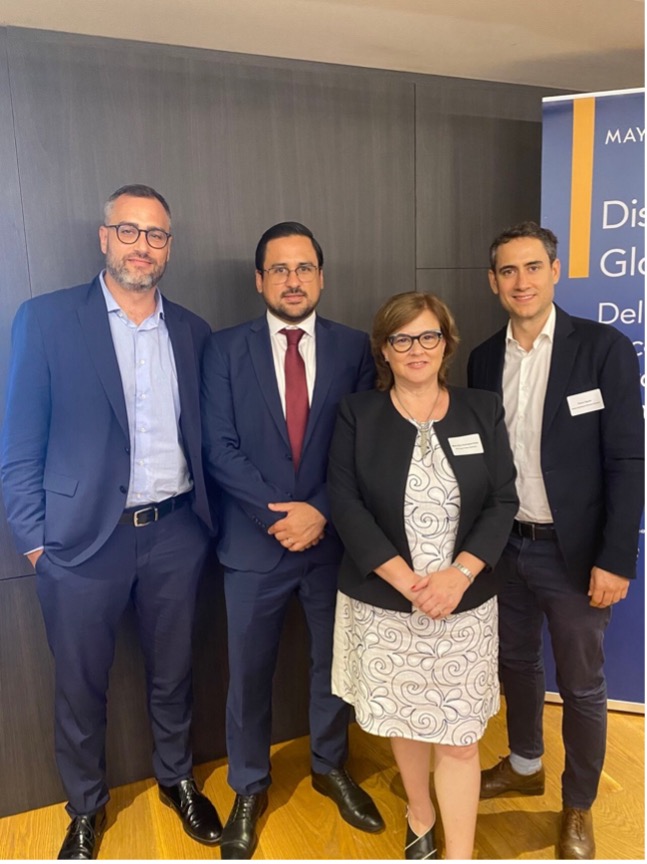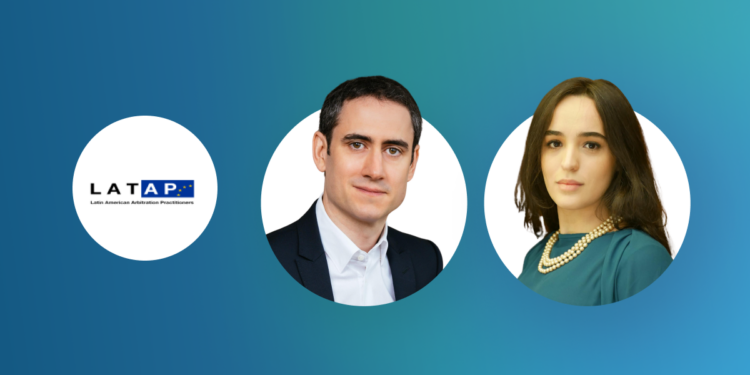THE AUTHORS:
Pierre Viguier, Senior Associate at Gaillard Banifatemi Shelbaya Disputes
Fernanda Botti Vilaça Martins, Trainee at Gaillard Banifatemi Shelbaya Disputes
Latin American Arbitration Practitioners EU (LATAP EU) is an association aimed at building a network of practitioners focused on international arbitration and with strong ties to, or experience in, Latin America and based in Europe. On September 2023, LATAP EU organized its first Annual Conference in Paris, France, hosted by Mayer Brown.
Introducing the Panel

On 6 September 2023, the Latin American Arbitration Practitioners EU (“LATAP EU”) organized its first Annual Conference in Paris, France, which was hosted by Mayer Brown. The conference program included a panel on the resolution of sports disputes related to Latin America. The panel was moderated by Pierre Viguier (Senior Associate at Gaillard Shelbaya Banifatemi Disputes) and featured Maria Elisa (Marisa) Dominguez Rubio (Senior Legal Counsel at FIFA, Football Regulatory Subdivision), Miguel Ángel Dávila (Founding Partner of the Paris-based law firm Winter Dávila & Associés), and Marco Vedovatti (Partner at Bratschi, one of the leading law firms in Switzerland).
All Roads Lead to… Sports Law
Pierre Viguier introduced the panel by explaining that, before becoming sports lawyers, all the speakers practiced sports at a high level, except for himself. Although he nurtured the dream of becoming a professional football player during his childhood, Pierre quickly understood that he clearly lacked the innate talent. In 2019, he eventually decided to combine his passion for sports together with his calling as a dispute resolution lawyer. Pierre is now a key member in the domestic and international sports law & arbitration practice of GBS Disputes.
Marisa Dominguez Rubio, who is Argentinian, practiced field hockey in the club Arquitectura in Buenos Aires, and played one year in the club Grasshopper Zürich, a professional multisport club based in Zurich, Switzerland. Marisa shared with the audience that, in her childhood, she loved to go to River Plate’s stadium “Estadio Monumental” to see football matches with her family and that she had the chance to witness Argentina winning the 1978 FIFA World Cup at home. Marisa’s story with sports law also started in Argentina when she was contacted by a friend seeking advice in a case related to the transfer of a football player (the famous Pablo Aimar) from River Plate to Valencia CF, Spain. Following her subsequent sports law experience, Marisa attended the FIFA Master – International Master in Management, Law and Humanities of Sport and, in that context, she eventually joined the FIFA legal department in 2004.
Peruvian Miguel Ángel Dávila and Swiss national Marco Vedovatti have both received a long ovation for their impressive professional athlete’s background. Miguel Ángel was a rugby player in the first division of Peru, and he won three national championships. He also was a player of the Peruvian national rugby team. When asked whether it was emotionally comparable to win a match as a player and a case as a lawyer, the answer of Miguel Ángel was a clear “no”, and his face indicated that the sports souvenirs still prevail. Miguel Ángel specialised in sports law, and in 2019, he decided to move to Paris. Due to his extensive experience in sports-related disputes, he was recently admitted to the list of arbitrators of the Court of Arbitration for Sport (CAS).
During his childhood in Lugano, Marco spent his time either at school or in the swimming pool. He eventually was part of the Swiss National Swimming Team, and as such, he participated in the World Aquatics Swimming World Cup (formerly known as the FINA Swimming World Cup). That explains why Marco’s practice in dispute resolution focuses particularly on international sports arbitration, including the related court proceedings. Admitted to practice in Switzerland and Spain, Marco represents clients before the judicial bodies of national and international sports federations, before the CAS, and before the Swiss Federal Tribunal in setting-aside proceedings of arbitral awards. He is also lecturer in both international sports arbitration and Swiss law in Spain and Colombia.
Be it through academic specialization, practical involvement, or the continuation of a brilliant career as an athlete, the speakers have shown that there is no rule of thumb for entering into sports law and arbitration practice. There are many ways one can join this field, subject to hard work and dedication.
Latin America and Sports Disputes
Pierre first introduced the genesis of the sports dispute resolution system. He highlighted that the adoption of arbitration as a dispute resolution method was motivated by both the golden rule in sports at the time – namely, settling the disputes internally, “as a family”, without resorting to State courts – and the necessity to have an appeal instance for decisions of international sports federations or any other sports-related bodies, including the International Olympic Committee (IOC). In this context, the IOC created the CAS in Lausanne, Switzerland, in 1984. The CAS is a dispute resolution centre that constitutes panels which have the responsibility of resolving disputes arising in the context of sport by arbitration and/or mediation pursuant to the CAS procedural rules.
Following his introductory speech, Pierre requested Marisa to describe the role of FIFA. She explained that, in its capacity as the international governing body of football worldwide, FIFA establishes fundamental principles and rules that apply to all its member associations. In this regard, Marisa emphasized the importance of the FIFA Regulations on the Status and Transfer of Players (RSTP). For example, the RSTP contains strict provisions regarding the transfer of minors, to prevent any situations of human traffic. As Latin American clubs have a relevant role in training young talents, who are later transferred abroad (especially to Europe), Marisa explained that the RSTP provisions are at the core of a high number of disputes involving Latin America´s parties. Regarding the resolution of the disputes at the FIFA level, Marisa described in detail the role of the three FIFA judicial bodies (namely the Disciplinary, Appeal and Ethics Committees), and the Football Tribunal, which is composed of three chambers (namely the Dispute Resolution Chamber, the Players’ Status Chamber, and the Agents Chamber). As explained by Marisa, the number of disputes raised exponentially since 2004, in conjunction with the increase of the international transfers of players worldwide, including from Latin America.
In response to Pierre’s questioning, Miguel Ángel then addressed the resolution system of domestic sports disputes in Peru. He specifically described his current roles as the President of the Justice Commission of the Peruvian Rugby Federation, and as arbitrator in the Chamber of Conciliation and Dispute Resolution of the Peruvian Football Federation. Then, as he was recently appointed as a CAS arbitrator, Miguel Ángel explained the process to be admitted to the CAS’s closed list of arbitrators. Miguel Ángel also addressed the dispute resolution proceedings before the CAS. He first explained that the CAS has jurisdiction to hear any kind of disputes related to sports. Depending on the type of disputes, they will be subject either to the ordinary arbitration procedure (such as contract disputes related to sponsorship, broadcasting, etc.), the appeal arbitration procedure (disputes concerning the decisions of federations (such as FIFA), associations or other sports-related bodies), or the anti-doping division (disputes related to anti-doping matters). Miguel Ángel further addressed the growing number of LATAM-related cases before the CAS. For this reason, since 2020, Spanish is one of the three working languages of the CAS, along with French and English.
Following up on that topic, Pierre questioned Marco about his practice as counsel before the CAS. First, Marco stressed the importance of Swiss law for CAS arbitration. Second, Marco addressed the general critics that are raised against the CAS system. Then, Pierre and Marco discussed the setting-aside proceedings of CAS awards before the Swiss Federal Tribunal. Marco recalled that the grounds for setting aside arbitral awards provided in the Swiss Private International Law Act (PILA) are also applicable to CAS awards. He then pointed out relevant setting aside cases involving Latin American parties. In Guillermo Cañas v. ATP Tour, the Swiss Federal Tribunal decided that although the waiver of setting aside proceedings against any CAS awards is valid under the PILA, it cannot be enforced against athletes. It considered that, due to the forced nature of the CAS arbitration, the right to challenge CAS awards could not be validly waived by the athletes to balance the lack of consent to the arbitration agreement contained in the sports-related bodies’ regulations. Moreover,in Francelino da Silva Matuzalem v. FIFA, the Swiss Federal Tribunal decided to set aside the CAS award on the ground of public policy violation, because the CAS award was de facto prohibiting the claimant – a Brazilian football player – from working as a professional football player worldwide and forever.
All the interventions of the stellar speakers pointed out the significant impact of Latin America in the disputes related to sports, which is reflected by the decision of the CAS to adopt Spanish as an official language. With questions from the audience and final remarks by Pierre, the dream team left the field under applause.
ABOUT THE AUTHORS
Pierre Viguier is a senior associate at Gaillard Banifatemi Shelbaya Disputes. He acts as counsel in both investment and general commercial arbitrations, including sports-related disputes. Pierre is a key player in the domestic and international sports law & arbitration practice of the firm.
Fernanda Botti Vilaça Martins is a trainee at Gaillard Banifatemi Shelbaya Disputes. She is a Brazilian qualified lawyer with three years of experience as counsel and tribunal secretary in international commercial arbitration. Fernanda holds an LL.M. in International and Comparative Law from the University of São Paulo, where she also graduated, and an LL.M. in International Dispute Settlement (MIDS) from the Geneva Law School and the Graduate Institute of International and Development Studies.
* This report has been approved by all the conference speakers.





